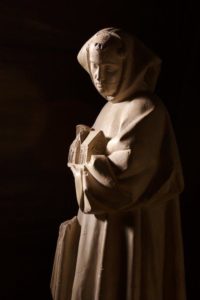Born into the best of Burgundian families, refined, intelligent and charismatic (recall that he will gather a small army of friends and family to join him in his monastic quest) Saint Bernard, very eager and ardent, enters Cîteaux at the age of twenty. But very soon, legend has it, Bernard hits the wall. He comes face to face with his helplessness. It is the time of the harvesting, and the field work is much too difficult for him. He is somewhat delicate after all. It is probably then that he realizes that the simplicity and humility he so longs for will not come naturally. They will be pure gift, given to a broken, contrite heart. It is then in his desperation that Bernard hears the Lord say, “O Bernard, why have you come here?” Why have you come here? It is a compellingly beautiful question that continues to haunt us as monks. Why have we come here? Whom do we seek? Who is worth the effort, the relentlessness of life in the cloister?

It is a question that quickly exposes any illusions we may have had of who we are or who we want to be. And hopefully like Saint Bernard we come to realize that desperation is probably not such a bad thing. The pressure makes you focus. You bow; you open your hands and heart in total receptivity and say with the Psalmist, “I was helpless, so he saved me.” Helpless without him. It is perhaps best of all, down there in that low place of our vulnerability, that we can be most available to Christ Jesus.
Which of us, knowing the truth of who we are, feels really comfortable hearing Jesus’ words, “You are the light of the world.”? I want to respond, “Excuse me, my Lord, you’ve got the wrong party. Try a couple of cells down the hall. I’m not light; it is you who are my light. I’m a mess; it’s pretty dark in here.” But Jesus insists, “Yes, you are light.” He has noticed the glimmer of our desire, the flicker of our loving-kindness, the incipience of our compassion; and he assures us, it is enough, we are enough, enough to light the way for him, for God’s people; for he will make the flicker in our hearts into a blazing fire.
Where does Christ’s light come from? For Bernard it is clear. The light shines out most all from Jesus’ wounds. The light is his mercy, his compassion expressed perfectly through his passion. This is what he says, “The man who said: ‘My sin is too great to deserve pardon,’ was wrong…As for me, I take whatever I lack from the heart of the Lord which overflows with mercy…They pierced his hands and feet and opened his side with a spear. Through the openings of these wounds, I can suck honey from the rock…I can taste and see that the Lord is good…The lance pierced his soul and…his heart, so that he might be able to feel compassion for me in my weaknesses. Through these sacred wounds we can see the secret of his heart, the great mystery of his love…and mercy. Where have your love, your mercy, your compassion shone out more luminously than in your wounds, sweet, gentle Lord of mercy.”
The burden is on God; for the light we are called to be is always reflected, refracted light from the wounded, mercy-filled Christ Jesus whose open heart and wounds blaze with the light of his compassion. We are called, invited more and more into a becoming that is cooperative. It’s not about us. We have only to be broken, transparent, reflective, compassionately vulnerable, then we will be light in him.
Our invitation is to be kingdom, a place where the light of compassion and mercy shine out, a living symbol of hope in a world especially now darkened by terror, pandemic and a relentless divisiveness to which we perhaps have become inured. The persistence of our seeking for the Lord Jesus and his way, all our efforts to love, all our lisping attempts at prayer, in all of this, we hope we are bringing light to the people of God. But how? ….